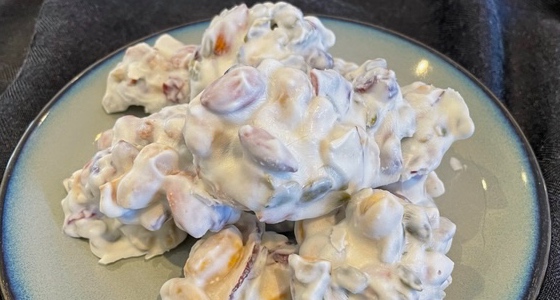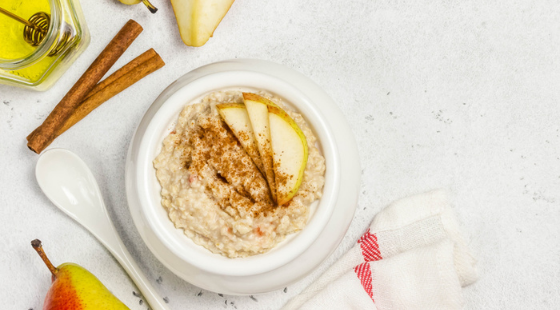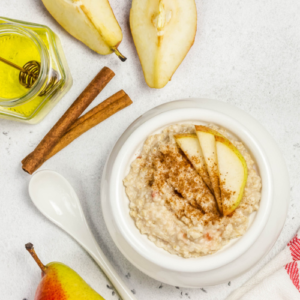Mental health challenges are linked to low diet quality. Research found people who ate more unhealthy food were more likely to report psychological distress compared with people that eat a healthier diet. More specifically, eating fried foods or foods contain too much sugar and processed grains is linked to depression. (Jim E. Banta, Ph.D., et. Al 2019)
A recent study posted to BMC Medicine demonstrated that even people with moderate to severe depression improved their mood and signs of depression by eating a more healthful diet. The study was the first to prove that diet alone could reduce depression symptoms. The dieters followed a specific program for 12 weeks that included one-on-one nutrition counselling. The treatment diet encouraged eating whole foods while discouraging things such as refined foods, sweets, and fried food. The results: Participants showed greatly reduced symptoms when compared to other groups. In addition, more than 32 percent of participants experienced remission, so were no longer considered depressed. Jacka, O’Neil et al 2017.
But what are the specific foods or nutrients we should be consuming to help support a healthy mood? Below are our top 6!
-
Good fats fight depression
Research shows that people who consumed the most fish were less likely to experience symptoms of depression (the Journal of Epidemiology and Community Health). Given that a 3.5-ounce (100-gram) serving of salmon provides 2,260 mg of EPA and DHA, eating this fish a few times per week is a great way to get these fats into your diet. The best oily fish to consume to get your EPA and DHA includes salmon, sardines, mackerel, anchovies, herring, halibut, rainbow trout and tuna.
Check out our Smoked Salmon Avocado Toast for a 3-minute recipe to help you consume for healthy fats!
A recent review of clinical studies concluded that taking fish oil supplements improved depressive symptoms in people with depression, with effects comparable to those of antidepressant medications. However, the greatest improvements in depressive symptoms seemed to occur in people who were also taking antidepressants. Additionally, people tended to see greater effects when the fish oil supplement contained higher doses of EPA (1). This might likely be due to its anti-inflammatory properties since inflammation can contribute to depressive symptoms.
The fish oil supplement that we recommend that has been formulated specifically for depression is NFH Trident SAP. Check it out in our online dispensary!
-
Your morning cup of coffee “pick me up”
Although coffee has its positives and negatives there is no mistaking it is an integral part of many people’s morning routine. But interesting enough, it might also be helping to beat off the blues.
The caffeine in coffee prevents a naturally occurring compound called adenosine from attaching to brain receptors that promote tiredness, therefore increasing alertness and attention (2). Since depression can often cause people to feel low motivation and fatigue this can help to give them that much needed boost.
Moreover, coffee increases the release of mood-boosting neurotransmitters, such as dopamine and norepinephrine (3). A study in 72 people found that both caffeinated and decaffeinated coffee significantly improved mood compared with a placebo beverage, suggesting that coffee contains other compounds that influence mood. Researchers attributed this boost in attitude to various phenolic compounds, such as chlorogenic acid. Although still, more research is needed (3).
#3. Eat your Dark Chocolate
Chocolate is high in health-promoting flavonoids, which have been shown to increase blood flow to your brain, reduce inflammation, and boost brain health, all of which may support mood regulation (4, 5).
Finally, chocolate has a high hedonic rating, meaning that its pleasurable taste, texture, and smell may also promote good mood (6,7).
Because milk chocolate contains added ingredients like sugar and fat, it’s best to opt for dark chocolate—which is higher in flavonoids and lower in added sugar. You should still stick to 1–2 small squares (of 70% or more cocoa solids) at a time since it’s a high calorie food. We’ve also create this Chocolate Bark recipe, if you want to super-power your daily dose of chocolate.
#4 . Berries every day keep the blues away
Curiously, eating more fruits and vegetables is linked to lower rates of depression (8,9). Although the mechanism isn’t clear, a diet rich in antioxidants may help manage inflammation associated with depression and other mood disorders (10).
Berries pack a wide range of antioxidants and phenolic compounds, which play a key role in combatting oxidative stress—an imbalance of harmful compounds known as free radicals in your body (10). They’re particularly high in anthocyanins, a pigment that gives certain berries their red-purple-blue colours. One study associated a diet rich in anthocyanins with a 39% lower risk of depression symptoms (11).
A study recently concluded that blueberries, strawberries, blackberries, and raspberries may block the chemicals that cause depression and anxiety (12), while another recent study found that people who drank a glass of pomegranate juice (with no added sugar) each day for two weeks had measurably less depression and anxiety, as well as lower blood pressure (13). If you find it difficult to include enough fruits and veggies in your diet, check out this supplement option.
-
Go Nuts for Cashews
Cashews are high in tryptophan, which, helps increase levels of that happiness-inducing neurotransmitter, serotonin.
Cashews are actually one of the best sources of the amino acid tryptophan among all plant-based foods with 1000-2000 milligrams per 1/4 cup serving. This amino acid is critical for improving the uptake of serotonin in the brain and acts as a direct precursor to the anti-depressant hormone itself. Cashews are a tiny package of iron, magnesium, Vitamin B6, protein and important amino acids, and even omega 3 fats. All of these nutrients directly ward off mild depression and anxiety naturally.
So, without tryptophan in our diets, we not only can’t produce serotonin as effectively, but our bodies also can’t use the amount of serotonin that we do have. A depletion of serotonin can make us feel anxious, stressed, and just downright sad.
Consuming just a small a handful of cashews can help boost your serotonin levels!
#6. Have a Go with Avocados
Avocado is a superfood when it comes to depression as it contains tryptophan, folate AND omega-3. Omega-3 is an essential fatty acid that helps combat inflammation in the brain and also helps regulate our brain’s neurotransmitters helping our brain to run smoothly.
Three-fourths of the calories in an avocado are from fat, mostly monounsaturated fat, in the form of oleic acid. An average avocado also contains 4 grams of protein, higher than other fruits, and is filled with vitamin K, many of the B vitamins (B9, B6, and B5), vitamin C, and vitamin E12. Finally, they are low in sugar and high in dietary fibre, containing about 11 grams each.
The high levels of folate in avocados may help keep depression symptoms at bay. Foods containing high levels of folate may help to decrease the risk of depression because folate helps to prevent the build-up of homocysteine, a substance that can impair circulation and delivery of nutrients to the brain. Excess homocysteine can also interfere with the production of serotonin, dopamine, and norepinephrine, which regulate mood, sleep, and appetite.
In summary, you can help yourself beat the blues by reducing your intake of sugar, refined grains and fried foods and incorporating more berries, avocados, oily fish, raw cashews, dark chocolate, and a morning cup of coffee into your diet. Remember, it’s making small do-able simples changes into your diet on a daily basis that can take you a long way to a happier and healthier you!
References
- https://www.ncbi.nlm.nih.gov/pmc/articles/PMC4872453/
- https://www.ncbi.nlm.nih.gov/books/NBK519049/
- https://pubmed.ncbi.nlm.nih.gov/30274327/
- https://pubmed.ncbi.nlm.nih.gov/24117885/
- https://pubmed.ncbi.nlm.nih.gov/29539647/
- https://pubmed.ncbi.nlm.nih.gov/24117885/
- https://pubmed.ncbi.nlm.nih.gov/16546266/
- https://pubmed.ncbi.nlm.nih.gov/30764679/
- https://pubmed.ncbi.nlm.nih.gov/26691768/
- https://pubmed.ncbi.nlm.nih.gov/29662448/
- https://pubmed.ncbi.nlm.nih.gov/29695122/
- Keservani RK, Sharma AK, Kesharwani RK. Medicinal Effect of Nutraceutical Fruits for the Cognition and Brain Health. Scientifica (Cairo). 2016;2016:3109254. doi:10.1155/2016/3109254
- Al-Dujaili E, Smail N. Pomegranate juice intake enhances salivary testosterone levels and improves mood and well being in healthy men and women. Endocr Abstr. 2012;28:313.













